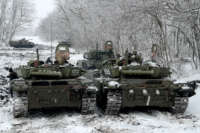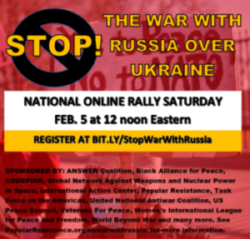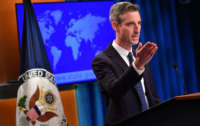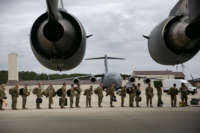
The U.S. warns Russia could soon invade Ukraine, as diplomatic talks continue in Moscow and Washington and the U.S. sends more military equipment to Ukraine. We look at the potential of war from the seldom-discussed perspective of citizens of Ukraine. “This Russian brinkmanship is having a devastating effect on the Ukrainian economy, even without an invasion,” says Russian American journalist Masha Gessen, who just returned from reporting in Ukraine. Foreign policy expert Anatol Lieven says that while a Russian invasion of Ukraine remains a possibility, “there clearly is a desire in Moscow to pursue a diplomatic path” to resolve the crisis without war.
TRANSCRIPT
This is a rush transcript. Copy may not be in its final form.
AMY GOODMAN: Top-level diplomatic talks are continuing in an attempt to defuse the crisis over Ukraine. French President Emmanuel Macron is meeting with Russian President Vladimir Putin in Moscow today. Macron will then head to Kyiv and meet with Ukrainian President Volodymyr Zelensky Tuesday. On Friday, Putin traveled to Beijing to meet with Chinese President Xi Jinping and attend the opening ceremony of the Winter Olympics. The two leaders signed a joint statement calling on the United States and other Western nations to, quote, “abandon the ideologized approaches of the Cold War.” They also called for no more expansion of NATO. Meanwhile, Germany’s new Chancellor Olaf Scholz will meet with President Biden at the White House today.
Over the weekend, U.S. officials claimed Russia now has in place 70% of the forces it needs to invade Ukraine. Meanwhile, the U.S. continues to send military equipment and munitions to Ukraine. CNN reports an 80-ton shipment of military aid arrived recently. It’s the eighth U.S. shipment in recent days. U.S. intelligence assessments reportedly predict a full-scale Russian invasion of Ukraine could lead to 50,000 civilian deaths in Ukraine. President Putin has denied claims he plans to invade Ukraine.
For more, we’re joined by two guests. Anatol Lieven is senior fellow at the Quincy Institute for Responsible Statecraft, author of numerous books on Russia and the former Soviet republics, including “Ukraine and Russia: A Fraternal Rivalry. We are also joined in New York by Masha Gessen, award-winning Russian American journalist and staff writer at The New Yorker, where their most recent piece is headlined “How a City Close to the Ukraine-Russia Border Has Been Shaped by War.”
Masha, let’s begin with you. You’re just back from Kyiv. Can you just describe the scene on the ground, the people you spoke to, how people are preparing, or not, for a confrontation?
MASHA GESSEN: Thank you, Amy. And thank you for having me.
So, I spent some time in Kyiv and also in Kharkiv, which is a city close to the Russian-Ukrainian border. I’d say the situation in those places is a little bit different. People in Kharkiv have been living close to the war, right? And it’s important to remember that when we talk about Russia invading Ukraine, well, that happened eight years ago. We’re actually coming up on an anniversary. We’re talking — so, what they’ve had for the last eight years is a simmering armed conflict that continues to claim lives on a daily basis, right? Every day people die in what Ukrainians refer to as the ungoverned territories, which are the two self-proclaimed republics, the Luhansk People’s Republic and the Donetsk People’s Republic in the east of Ukraine, which is where Russia invaded eight years ago. Kharkiv is right next to those places. Kharkiv knows what it’s like to be in that state of simmering conflict and, more important, I think, in a state of total lawlessness and ongoing violence that people in those places are experiencing.
And this is something that I think Russians don’t quite understand, that over the eight years of that conflict, people in Kharkiv have really forged a Ukrainian identity that is entirely separate — and this is what Americans fail to understand — entirely separate from their linguistic identity — right? — but a very strong national identity. And there’s a kind of fortification of patriotic feeling that always happens in wartime. We know this. And you feel it very strongly in Kharkiv. So, a lot of people are kind of saying, “OK, bring it on. We’ve known for a long time this was going to happen.” Obviously, this is bravado in a lot of ways. Obviously Russia is capable of using overwhelming force that would lead to an incredible amount of bloodshed. But I think people there are very far from where they were eight years ago, which was caught unawares, where something like the Russian invasion was just unimaginable eight years ago. These days I think they feel like they know what it’s like, and they’re prepared, as awful as it’s going to be.
Kyiv is a different story. In Kyiv, people, I think, are living sort of on two tracks. One, they think it’s completely — you know, it is unimaginable to them. They haven’t been living next a war zone for eight years. So, the possibility of bombing of Kyiv, which is part of what, unfortunately, is predicted by some analysts, just seems absurd to them. And at the same time, they’re thinking, yeah, there’s nothing you can — they can’t plan for next week, because you have been in this — you’re placed in a state of suspended animation. So there’s a real sense of doublethink in Kyiv.
AMY GOODMAN: And then talk about the people that you spoke to and how, in everyday life, men, women, children are planning. I mean, from the United States’ perspective, the U.S. pulled back the word “imminent” invasion, but they are suggesting that’s the case every day. But I got the sense from your pieces, and especially the piece you wrote, “How a City Close to” — the piece that you wrote on —
MASHA GESSEN: On Kharkiv.
AMY GOODMAN: On Kyiv. You know, people are taking different approaches, whether —
MASHA GESSEN: Right.
AMY GOODMAN: — to flee or to stay and fight.
MASHA GESSEN: So, the Ukrainian government, understandably, has been trying to project a sort of sense of calm, because part of what’s happening is this Russian brinkmanship is having a devastating effect on the Ukrainian economy. Even without an invasion, it’s an incredibly destructive thing for the country. So, the president of Ukraine has been — and some of his ministers have been saying, “Look, what we’re seeing now is not substantially different than anything that we saw over the course of 2021. They keep amassing troops on the border. They keep pulling them up, then pulling them back. We can’t react to every one of those fluctuations as though war were imminent. We have to keep living our lives; otherwise, this is incredibly destructive.”
And I think, to some extent, he has succeeded in projecting a sort of calm. And people are really saying, you know, “Why, what’s all this talk of war, is this is so media-driven.” It’s amazing. I have dozens of interviews in the course of my time in Ukraine, and I don’t think there was a single person who didn’t use the phrase “wag the dog” in describing what they were experiencing. And at the same time, they understand that the threat is real.
AMY GOODMAN: Explain that, for people who aren’t familiar with that reference, Masha.
MASHA GESSEN: The reference is to the film Wag the Dog, where a U.S. administration, a fictional U.S. administration, sort of manufactures of war in Albania, I believe, which I think people in the administration don’t even realize is a real country, and it’s a completely media-driven phenomenon. And the war is sort of the side effect of a media controversy. I’m summing it up from memory. It’s been a long time, more than 20 years. But that’s the movie. And so, a lot of people are perceiving it as a media-driven phenomenon, something that’s happening in a kind of virtual space, except it’s going to affect them physically and tragically.
So, the mayor of Kyiv — or, a deputy mayor of Kyiv said last month — or, actually, in December now, said, “Look, you should have a go bag. You should be prepared.” And that was a first wave of panic. So people have been stocking up on supplies. People have made contingency plans. Some people are planning to go west, to western Ukraine, which they assume is not going to be affected by warfare. Some people are planning to leave the country. Some people are planning to send their kids out of the country. Some people are stocking up on gasoline for generators and planning maybe communal living so they can help each other in case there’s no electricity, there’s no internet, there are food shortages, etc. I mean, we’re still talking about winter — right? — so people are very concerned about being able to heat their homes.
And there’s also a real mobilization effort. There’s a thing called territorial defense, which is a kind of civilian/military reserve that is part of the military chain of command. They have had an extraordinary number of people signing up just in the last weeks and couple of months. So they’re training every weekend.
And you really do have a sense of — on the one hand, you’re sort of walking around Kyiv. It’s a beautiful, vibrant city, with lots of great food. People are sitting around in restaurants. It’s very easy to forget about COVID there. And at the same time, every conversation turns to subjects of preparedness. And a lot of people are actually actively either taking — training militarily or thinking of at least taking up arms.
AMY GOODMAN: I wanted to bring Anatol Lieven into the conversation, of the Quincy Institute for Responsible Statecraft. You’ve got Macron in Moscow today, then headed to Kyiv to meet with the Ukrainian president, meeting with Putin today. You’ve got the new German chancellor, Scholz, in Washington, D.C., meeting with Biden. Your sense of what could happen right now?
ANATOL LIEVEN: Well, I think there is a good deal of room, actually, for diplomatic progress and at least a sort of interim diplomatic agreement around issues that have been either raised or left open by the American response to Russia’s démarche — in other words, arms limitation agreements, especially on the stationing of missiles, a resumption of nuclear arms reduction talks, and perhaps at least an informal agreement on a moratorium or delay on NATO membership for Ukraine, which actually sacrifices nothing, because nobody thinks that Ukraine can join NATO in the foreseeable future anyway, so this is a point of principle rather than a point of actual reality. And then, beyond that, there is the issue that was also raised both by the American response and by President Macron, but somewhat vaguely, which is the possibility of some kind of new European security architecture in which Russia would have at least more of a consultative role. So I think that there is a diplomatic way forward.
And I myself would actually follow what the Ukrainian government has been saying and say that a Russian invasion is not imminent, because a good many people said that the Russian demands were pitched so high that Moscow must have known that they couldn’t be accepted, and this was simply a pretext for Russian invasion, but I think if that was true, then the Russians would have invaded already. There clearly is a desire in Moscow to pursue a diplomatic path. Now, where that will lead, we don’t know. And, of course, war remains a distinct possibility, but I would not myself say that we need to be immediately afraid of it.
AMY GOODMAN: You’ve written a piece, “How Emmanuel Macron can end the threat of war in Europe: The French president can borrow a phrase from Charles de Gaulle and say ‘non’ to Ukraine joining NATO.” Do you think it’s that simple, Anatol?
ANATOL LIEVEN: Well, it’s not simple for Macron. Obviously, he is under multiple different pressures. France is highly dependent, for example, on the United States to support its efforts against some Islamist revolt in western Africa.
But in one way, it is simple, because, as I said, it’s not actually possible for Ukraine to join NATO, not merely in the next few years but basically ever. And the reason for that is very simple: Ukraine, as Dr. Gessen said, is involved in a frozen de facto conflict with Russia, and bringing Ukraine into NATO would imply NATO sending very serious numbers of troops, Cold War numbers, 100,000 American troops, to defend Ukraine against Russia. Well, that is simply not going to happen. You know, apart from everything else, nobody wants war with Russia, and nobody wants that kind of distraction from China. And NATO’s European members are most certainly not going to send troops to defend Ukraine. So, the whole issue of Ukraine’s NATO membership is in fact purely theoretical, so that, in some respects, this whole argument is an argument about nothing — on both sides, it must be said, Russian as well as the West.
AMY GOODMAN: Masha Gessen, your response?
MASHA GESSEN: I agree with Anatol, but we have to think about why, when it’s a debate about nothing. When Russia is perfectly well aware that the possibility of Ukraine joining NATO is zero, why is Russia raising this topic? And why is Russia demanding guarantees — and Russia is demanding guarantees that Ukraine will never join NATO — guarantees of something that is not going to happen? So, I agree that it’s a pretext, but it’s also a demand for something bigger, right? And it’s a demand for exactly the kind of attention that Russia is getting right now, which is, you know, the whole world is swirling — the whole Western world is swirling around Russia, trying to convince Vladimir Putin to step back.
The danger here is that considering that Russia’s demands will never be fully met, I don’t think it’s going to get a guarantee, even though, again, it would change nothing in the real state of things, because it’s not going to get a complete guarantee. And at a certain point, it’s going to lose the world’s attention. That’s when I think the danger point comes, because the purpose of this is not — again, because we know this is a pretext, the purpose is to do something else. And what is the something else? A large part of it is creating a sense among Russians that Russia matters, that Vladimir Putin is a world leader, that he says something and the whole world gets moving, and that he can command the world’s attention. It taps into feelings of resentment and a sense of being left out and diminished, that Putin’s politics consistently tap into. And when he loses that opportunity, I think that’s when it becomes really risky. So, I don’t think there’s an imminent invasion, but I also don’t see how, in the long term, this game of brinkmanship can end with anything but a big war.
AMY GOODMAN: Anatol Lieven, let me ask you about the German chancellor meeting with Biden in Washington and what you feel should happen there, and also the meeting of Xi and Putin, the Chinese and Russian leaders, in Beijing last week, which was highly significant, the first time Xi met with a world leader in two years, since the pandemic, and that kind of alliance forming, even if they have plenty of differences, the U.S. pushing and NATO pushing, essentially, them together.
ANATOL LIEVEN: Well, I mean, Scholz in Washington is, of course, very anxious to present a united front to Russia as a deterrent to any Russian action, while at the same time praying, frankly, that Russia, of course, will not invade and that no massive NATO sanctions will be necessary, because, let’s not forget, talking about intensified sanctions for an American is very cheap, because America has very little trade with Russia and, of course, does not — hasn’t investment in Russia and does not depend on Russia for energy imports. Massive sanctions against Russia, for Germans, is very expensive, so, of course, the German government is hoping that it will not have to impose them. But for the moment, the stress is obviously on a combination of a united Western front but also, as I say, this fairly hopeful diplomatic process with Moscow.
As far as Putin and Xi, or rather Russia and China, are concerned, obviously they have a great many interests in common in pushing back against the West. But this is not going to be an alliance. China is not offering to fight for Russia in Ukraine. China has not recognized the Russian annexation of Crimea. And Russia is certainly not offering to fight for China over Taiwan. The biggest question is: If Russia does invade Ukraine and if massive Western economic sanctions are imposed, how far will China go in supporting the Russian economy? We don’t know. My sense, however, is that so far China has been fairly cautious about this, apart from anything else, because, of course, a war in Ukraine, with massive economic sanctions, would be extremely disruptive of the world economy, of world energy prices, and, at least in the short term, would be very damaging for China. So, this remains a partnership but, I think, well short of an alliance.
But if I could just push back a little on what Masha said, I think it is, partly at least, mistaken to talk about Putin’s domestic agendas and Russian feelings here. There are core Russian national security interests held by the Russian establishment as a whole and by a large part of the Russian people, which are, in certain respects, extremely close to those of the United States, you know, when it comes to its own backyard in Central America. Now, those are interests that America expects to be taken very seriously in its case, and, well, so does Russia.
AMY GOODMAN: Masha Gessen?
MASHA GESSEN: Well, I think that Putin’s primary concern is not strategic. But, you know, obviously, we can argue about what’s in that man’s head ’til the cows come home. And that’s part of the problem with dealing with a closed, secretive regime, especially one that has been in power for so long.
But I think what Putin is seeing is that his — he’s getting old. His regime is showing signs of wear. His popularity has waned. And the models available for either a safe retirement or continuing his rule in perpetuity are not encouraging for him. He has seen neighboring Belarus, which sustained the regime basically through consistent political repression, erupt in mass protests in August of 2020, and the only way that Alexander Lukashenko has been able to sustain the regime is with Russia’s help and the brutal use of force. He saw neighboring Kazakhstan attempt a sort of soft fake transfer of power with guarantees of security for the outgoing president, Nursultan Nazarbayev, and break into what appeared to be mass protests and, again, the use of force. And, in fact, the only use of military power by the post-Soviet security organization occurred in Kazakhstan earlier this year.
And so, it has to be going through Putin’s mind: How is going to sustain his personal power and the durability of his regime going forward? And I think that that’s — the only model that has worked for him is a model of sustaining his legitimacy through sort of pumping up his popularity, and that happens by showing that he’s a powerful man on the world stage. But also the biggest boost to his popularity ever was the annexation of Crimea in 2014. He can’t recreate it, but I think he keeps looking in the direction of Ukraine to see what he could do that will be at least somewhat like it.
And this is another, I think, very important consideration, which is sanctions. From Putin’s point of view, sanctions that were imposed on Russia in 2014 by both Western European countries and the United States were ultimately a net profit. Yes, the Russian economy — looking from the West, you would say the Russian economy took a huge hit. Looking from Russia, it spurred domestic production. It mobilized the population. It secured his political popularity. It was an all-around win. And so, thinking of sanctions as a deterrent, I think, has to be at least complicated. We can’t possibly assume that he thinks about sanctions as a net loss.
AMY GOODMAN: And finally, Anatol Lieven, isn’t Trump — and I do mean President Trump — actually getting what he wants? He was pushing for NATO countries spending 4% of their GDP on military weapons. The countries aren’t near there. The goal written — the goal was 2%. But it is increasing dramatically. What about who is ultimately winning here, the weapons manufacturers?
ANATOL LIEVEN: Yes, well, of course, it’s not just Trump who’s called for Europe to increase its military spending. I think every U.S. president has done that since Eisenhower. But let’s keep something in mind here. However much Europeans spend on defense, European soldiers will not fight Russia to defend Ukraine. They just won’t. I mean, that’s been made clear again and again. Nor most probably will U.S. soldiers. Therefore, I mean, two things to keep in mind. First, sanctions may not be very effective, or possibly at all effective, as Masha has said, but they are the only deterrent that we’ve got, because we won’t fight. The soldiers being sent to Eastern Europe are purely symbolic, because Russia does not have the slightest intention of attacking NATO. It would be a crazy thing to do.
MASHA GESSEN: Thank you.
ANATOL LIEVEN: But, by the way, Russia has repeatedly denied that it’s going to attack Ukraine. So, a great deal of this is, I’m afraid, theatrics on the part of the West.
AMY GOODMAN: Well, I want to thank you both for being with us, Anatol Lieven, Quincy Institute for Responsible Statecraft, speaking to us from Britain, and Masha Gessen, award-winning Russian American journalist, staff writer at The New Yorker. We’ll link to your latest pieces, “How a City Close to the Ukraine-Russia Border Has Been Shaped by War,” as well as your other piece that you wrote from Ukraine, from Kyiv.
Next up, we will talk about the Winter Olympics. As China hosts the Olympics, we speak to Human Rights Watch and a former member of the U.S. Olympic soccer team. Stay with us.
This post was originally published on Latest – Truthout.









 deputy defence minister tells
deputy defence minister tells  accused
accused  ok a fake video attack plot to frame
ok a fake video attack plot to frame 



